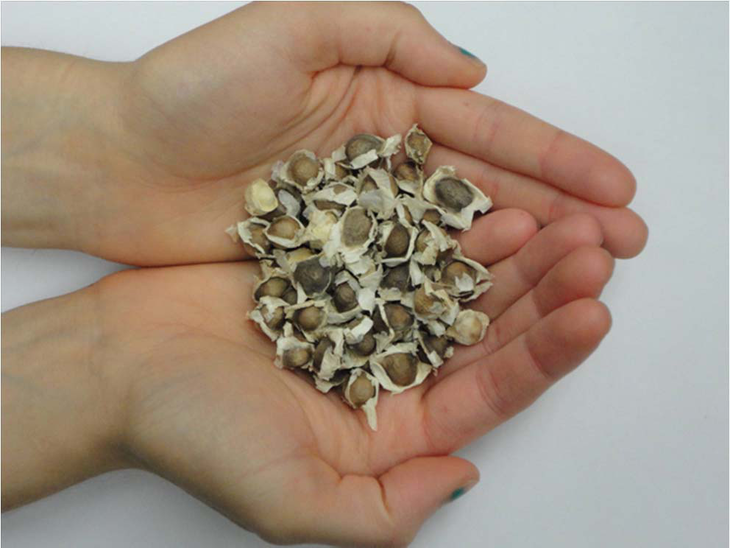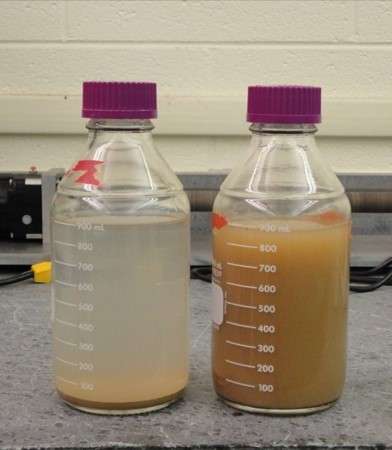Moringa oleifera seeds, used in ancient Egypt to clarify drinking water, contain a protein that makes bacteria clump together and die. Credit: Penn State
What would happen if a common tree had the potential to turn cloudy, contaminated water into clean, safe drinking water for millions in need? Penn State researchers are hoping to find out using the seeds of the Moringa oleifera tree.
Lack of potable water is a huge problem in many developing countries. According to UNICEF, 783 million people worldwide are without improved drinking water, and the World Health Organization estimates that lack of proper drinking water causes 1.6 million deaths each year from diarrheal and parasitic diseases.
Part of the problem is that many of these countries must import expensive chemicals to clarify the water, limiting the amount they can afford to produce.
But there may be an alternative.
The Moringa oleifera tree grows abundantly throughout many tropical and subtropical regions of the world. It reaches fruition in only six months and is already being used in many areas as a food source. The seedpods, seeds, leaves, roots and flowers are all edible and nutritious.
In addition to these benefits, something in the tree's seeds has the ability to kill bacteria and clarify water.
"That has been known for some time," said Stephanie Butler Velegol, environmental engineering instructor at Penn State. Women in ancient Egypt reportedly rubbed Moringa seeds on their clay water pots, and dried powder from crushed seeds has been used as a handwash for many years.
In recent years, the water-clarifying ability of Moringa powder was found to be due to a positively-charged protein called the Moringa Oleifera Cationic Protein (MOCP). When you crush the seeds and add them to water, this protein will kill some of the microbial organisms and cause them to clump together and settle to the bottom of the container.
Both bottles originally contained turbid, contaminated water. The bottle on the left was treated with crushed Moringa seeds. A protein in the seeds killed bacteria in the water and made them clump together and fall to the bottom of the bottle. However, this water will not be safe to drink for long because organic matter remaining in the water can serve as food for other bacteria. A technique developed by Penn State scientist Stephanie Velegol reduces this concern and provides water that remains safe to drink for a longer time. Credit: Penn State
However, the dried seed powder alone is not ideal for water purification because the organic matter from the seed will remain in the water, providing a food source for any bacteria that have not been killed. As a result, water treated with this seed does not remain safe to drink after some time in storage.
In 2012, Velegol and a team of Penn State researchers published a paper showing that MOCP can easily be attached to grains of sand. When the sand is mixed with unsafe water, bacteria stick to the sand and are killed. The newly-clean water can then be removed and stored for later use. Then the sand can be rinsed to remove the organic matter and "recycled" for another round of purification.
In Velegol's most recent study, published in the April edition of Langmuir, she, along with chemical engineering assistant professor Manish Kumar and chemical engineering students Kevin Shebek, Kathleen Lauser, Allen Schantz and Ian Sines, used a combination of cryogenic electron microscopy and fluorescence assays to discover that the cationic protein isolated from Moringa seeds kills water-borne bacteria by causing their cell membranes to fuse.
This study revealed the mechanism by which MOCP turns polluted water into safe drinking water.
But there are still questions to be answered before the Moringa protein can be used on a large scale to purify water. One question is which Moringa seeds are most efficient in water clarification. The researchers knew that leaves and seeds harvested in different seasons differ in nutrient content, but did the seeds' ability to kill bacteria also vary based on the season and the seed's maturity level?
"One of the biggest challenges in using Moringa seeds for cleaning water is that people don't know which seeds work and don't work," Velegol said.
This is a problem because if people use the wrong seeds, they will think their water is clean when, in fact, it's not.
Members of the research team that worked on the water-clarifying protein from Moringa seeds. In the front row, from left, are Stephanie Velegol, Kathleen Lauser, Bashir Abubakar and Andrew Neal; in the back row are Manish Kumar and Adam Uliana. Credit: Penn State
So the researchers teamed up with Bashir Abubakar, a botanist from Ahmadu Bello University in Zaria, Nigeria. Abubakar brought four kinds of seeds of different maturity levels and harvest times from Nigeria to Penn State. The researchers then studied their mass, oil content and ability to kill bacteria and clarify water.
They found that the extracted protein of mature dried seeds collected in the rainy season is most effective, followed by mature dried seeds collected in the dry season.
Abubakar, a native of Nigeria where about 66 million people do not have access to safe drinking water (UNICEF), foresees benefits to using Moringa that go beyond providing clean water to poor communities.
"The farmers will have an additional income, because not only will they be growing Moringa for food, but they can also grow large plantations of Moringa for the seed," he said.
In addition, the money saved by using the locally grown seeds to clarify water could then be used for other projects.
"You can divert the money for other infrastructural and societal needs, either to improve the farmlands or to construct roads," he said.
Journal information: Langmuir
Provided by Pennsylvania State University






















